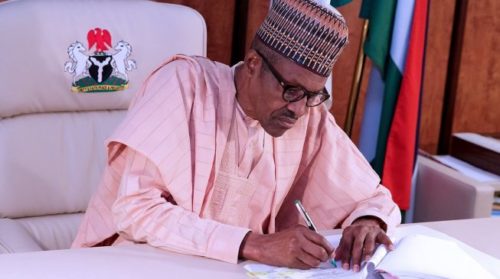
15 years after the Bureau for Public Enterprise (BPE) proposed an anti-trust law to check monopoly in the Nigerian economy, President Muhammadu Buhari has signed the Federal Competition and Consumer Protection bill.
The law seeks to eliminate monopoly and ensure competitive trade in the country.
Senior Special Assistant to the President on National Assembly, Ita Enang, disclosed this in a statement on Wednesday.
Enang said the new law repeals the Consumer Protection Council Act and sections 118-128 of the Investment and Securities Act.
The new act establishes the Federal Competition and Consumer Protection Commission as well as the Consumer Protection Tribunal to try violations.
“The law is to promote economic efficiency, maintain competitive market in the Nigerian economy, protect the Nigerian economy, protect the interest and welfare of consumers by providing consumers with wide variety of quality products at competitive prices as well as prohibit restrictive or unfair business practices in the Nigerian economy,” Enang said.
“This act has accordingly, upon assent been remitted to the national assembly/appropriate authorities as law of the federation.”
The functions of the commission, according to Enang, are as follows:
- Initiate broad based policies and review economic activities in Nigeria to identify anti-competitive, anti-consumer protection and restrictive practices which may adversely affect the economic interest of consumers and make rules and regulations under this Act and any other enactment with regards to competitions and protection of consumers.
- Advise the federal government generally on national policies and matters pertaining to all goods and services and on the determination of national norms and standards relating to competition and consumer protection.
- Report annually on market practices and the implications for consumer choice and competition in the consumer market.
- Eliminate anti-competitive agreements, misleading, unfair, deceptive or unconscionable marketing, trading and business practices.
- Resolve disputes or complaints, issue directives and apply sanctions where necessary.
- Create public awareness through seminars, workshops, studies and make available information with regard to the exercise of its powers and performance of its functions to the public.
- Regulate and seek ways and means of removing or eliminating from the market, hazardous goods and services, including emission, untested, controversial, emerging or new technologies, products or devices whatsoever, and cause offenders to replace such goods or services with safer and more appropriate alternatives.
- Publish, from time to time, list of goods and services whose consumption and sale have been banned, withdrawn, restricted or are not approved by the federal government or foreign governments.
- Encourage trade, industry and professional associations to develop and enforce in their various fields quality standards designed to safeguard the interest of consumers.